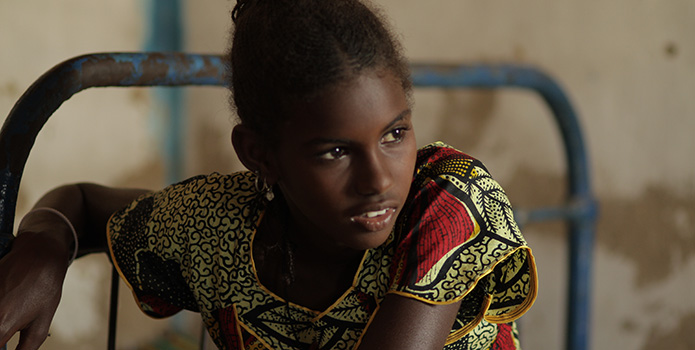 OUMBUL KQ IN TALL AS THE BAOBAB TREE Tradition vs. the individual talent: arranged marriage in a Senegal villageTall as the Baobab Tree
OUMBUL KQ IN TALL AS THE BAOBAB TREE Tradition vs. the individual talent: arranged marriage in a Senegal villageTall as the Baobab Tree is a striking first feature shot in Senegal by the 23-year-old American filmmaker Jeremy Teicher. The students and families of Sinthiou Mbadane, Senegal, collaborated with Teicher as cast members in making the film shot primarily in the village where they live, which he knew from previous work there.
The idea is to show the clash of generations through focusing on a high school girl attempting to resist the rather ruthless survival strategies of an African village where her father decides on an arranged marriage of an underage girl, "selling" his 11-year-old daughter Debo (Oumul Ka), the older girl's sister, to raise the money needed to pay to treat his elder son Sileye (Alpha Dia), whose leg is injured early on in a fall from a Baobab tree. Coumba (Dior Ka) vows to raise the money any way she can. She wants herself and Debo both to get an advanced education, and she gets a boy who has a crush on her to mind the cattle she's supposed to be watching as Sileya rests up, while she goes to town and works housekeeping in a small inn. It's a risky deception. Meanwhile their father (Mouhamed Diallo) looks for a man who'll take Debo as a second wife.
Coumba has trouble, constantly asking for more money and rebuffed by the inn owner. She seeks encouragement and advice from her former schoolteacher, who stands on the side of progress. With him and at the inn the spoken language is French; the rest is in the local dialect of the Pulaar language. With help from her admirer who's been watching the cattle, Coumba raises the needed money, and their father is welling to pull out of the marriage arrangement, but the village elder tells him he can't. The men are devout muslims, and their words are constantly laced with Arabic formulas expressing humility and faith in the will of Allah, and this attitude prevails, despite the counter-valance of the will of the young and the French-educated. So after a rebellious gesture, without more ado Debo goes off in a cart with her new husband.
Everything is nicely understated, with no effort at drama, the non-actors delivering their dialogue with quiet conviction, knowing very well the situations they are dramatizing. The feeling of authenticity is beautifully maintained. However, the whole thing is so low-key that only the most ethnographically inclined are likely to maintain interest to the end. However, Teicher did not act unwisely in avoiding overt violence in his story.
The outstanding feature of
Tall as the Baobab Tree is the visuals and the way they capture the authentic locations and cast. Crisp digital cinematography by Chris Collins does a fine job of bringing out the beauty of the people on screen and their colorful looks and clothing and velvety dark skin. Obviously state of the art HDSLR equipment was used. Jay Wadley’s African harp score provides a delicate and natural background, aiding the rhythm and never intruding. Teicher had worked in this Sengalese village, lacking running water, electricity or other amenities, for years doing a documentary short,
This Is Us (2011), previous to making this film, and has a feel and a reverence for the life that comes through here. Obviously only a well-established trust enabled Teicher to use all these villagers in roles that, in various ways, call their traditional culture into question. The issue of arranged marriages in Senegal, as he has explained in many interviews, is a big one and had come to the fore when he was making the documentary.
Tall as the Baobab Tree/Grand comme le Baobab, 82 mins., debuted at Montreal and has shown at Rotterdam and other festivals, including the April 25-May 9, 2013 San Francisco International Film Festival, where it was screened for this review and where it is a nominee for the New Directors award. Bruce Bailey's review and interview on
Flickfeast from the LFF provide more information than I have here.





